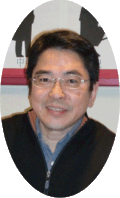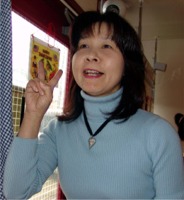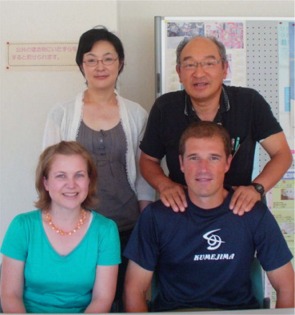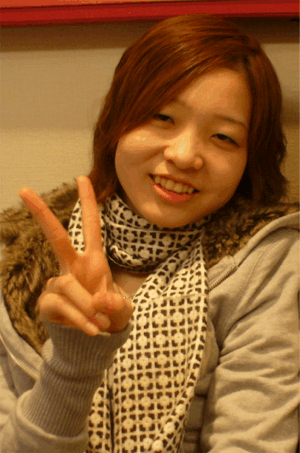|
|
- Hide Uemura
- Yumiko Miyajima
- Akemi Ito
- Yuko
Interview Blogs

Hide Uemura’s English Interview
March 8, 2009
Kristin: Why do you study English?
Hide: “Nowadays, there are more foreigners in Japan, so there’s more opportunity to talk with them. Since English is a world language, I need to learn it so I can communicate with foreigners. When I go to Tokyo, sometimes a foreigner will ask me for directions, and I can use my English to talk to them and recommend places to visit.
“I like traveling abroad, and I want to be able to enjoy it more by speaking English.”
Kristin: How do you use your English in your daily life?
Hide: “Sometimes foreigners come to my dental clinic, and I need to be able to communicate with them during their visit. I often attend dental lectures and seminars, and sometimes there are foreign guest speakers who lecture in English. I want to be able to understand their lecture in English, not just listen to the Japanese translation.”
Kristin: How do you learn new English?
Hide: “I attend a conversation class at Sloan’s English School, and this is my chance to learn everyday English that’s not from a textbook. I also read English news on the internet and check unfamiliar words with Popjisyo.”
Kristin: Do you have a tip for studying English?
Hide: “Use new vocabulary you learn as soon as possible. Try to make sentences with the words, and don’t be afraid of making a mistake. Your sentence doesn't have to be perfect for an English speaker to understand what you’re saying!”
Kristin: What is an incentive for you to study English?
Hide: “When I can successfully communicate with a foreigner, this gives me the motivation to continue studying English.”
Kristin: How much time per week do you spend using/studying English?
Hide: “I spent about 1.5 hours at the conversation class, and I used to listen to the radio whenever I had free time. I now listen to the radio while at work, but it’s mostly for background noise. Sometimes I listen to a music station, and other times I listen to talk radio.”
Kristin: What advice would you give to someone who wants to begin studying English?
Hide: “Don’t be shy! Learning English from a native speaker is important for learning pronunciation. They won’t laugh at you if you mispronounce a word or have a Japanese accent.
“If you’re too shy to learn English from a foreigner, try watching English programs on TV or listening to the radio. Instead of just listening, try repeating sentences or words to get comfortable speaking and to improve your pronunciation.”
Kristin: What tools do you use to study English?
Hide: “I use a dictionary, the radio, and PopJisyo, the internet translator.”
Kristin: What is your goal?
Hide: “I’d like to go abroad and not have to worry about the language barrier, as well as being able to understand about 60% of a conversation. I also want to watch foreign movies without subtitles, and understand foreign song’s lyrics.”
|
|
Yumiko's English Interview
March 1, 2009

Kristin: Why do you study English?
Yumiko: “When I was a child, I attended a Catholic primary school, and I had a chance to hear English from some of the foreign nuns. In junior high and high school, I studied grammar and reading in school, but I wanted to be able to speak English. Many years ago, when the Anacortes Sister City Exchange visited Kisakata, I could only use basic English to introduce myself. I wanted to be able to speak freely in English, so I decided to earnestly study English.”
Kristin: How do you use your English in your daily life?
Yumiko: “I attend a conversation class at Sloan’s English School, as well as the community English classes in Kisakata and Nikaho. When the sister city exchange groups visit, I converse with them. I keep in touch with friends by writing letters in English.
“I don’t have much free time during the day, so whenever I turn on the television, I see if there’s an English language program, such as the ABC News Shower, NHK programs, Eigo Shaberanaito, etc. I want to enjoy English when I have the time and when it’s available at the moment, so I don’t plan to watch a specific program or write a letter in English.”
Kristin: How do you learn new English?
Yumiko: “During class, I write down words or phrases I find interesting, and after class, I’ll look it up in my dictionary, or ask my husband the meaning or usage. If I hear an English word I want to use later in conversation, I’ll write it down, memorize it, and try to listen for it in another situation, like class or a TV program.”
Kristin: Do you have a tip for studying English?
Yumiko: “Talk to foreigners! If you have a question about English, it’s much easier to ask a foreigner directly rather than trying to find the answer in a dictionary.”
Kristin: What is an incentive for you to study English?
Yumiko: “My motivation is my determination. I’m ok with not studying English, but I want to continue improving my English. Many years ago, when the Anacortes sister city exchange group visited Kisakata, I could only use basic English to introduce myself. I decided that I wanted to studying English so I could improve my conversation skills.”
Kristin: How much time per week do you spend using/studying English?
Yumiko: “I probably spend about 2 – 3 hours a week studying/using English.”
Kristin: What advice would you give to someone who wants to begin studying English?
Yumiko: “Don’t be shy and enjoy English! Find a method of studying that works best for you. Studying should be a pleasure, not forced. Younger people should try writing to a penpal, or singing English songs you like.”
“If you want to learn about cultural references in English, I recommend reading American comic strips, like Peanuts, which often mention cultural words, jokes, customs, etc. Reading books and cartoons is an excellent way to learn a little bit about culture and customs. For example, I learned about Halloween jack-o-lanterns while reading Peanuts.”
Kristin: What tools do you use to study English?
Yumiko: “I use an electronic dictionary, and my husband!”
Kristin: What is your goal?
Yumiko: “I want to improve my overall English ability, especially my speaking.”
| |
 |
|
Akemi Ito’s English Interview
February 22, 2009
Kristin: Why do you study English?
Akemi: “I tried to study Chinese first, because I could read the Chinese characters, but I had a difficult time remembering the pronunciation and intonation of words. I decided that English was easier to learn and easier to speak. I also wanted to develop communication skill in a foreign language.”
Kristin: How do you use your English in your daily life?
Akemi: “On a daily basis, I have little time to speak, but I have time to read books, or use the Internet.”
Kristin: How do you learn new English?
Akemi: “I like to read, whether it’s a book or an article on the Internet. If I don’t know a word, I will use my electronic dictionary or an on-line dictionary to look it up.”
Kristin: Do you have a tip for studying English?
Akemi: “In this area, we have very few opportunities to speak English, so I recommend that people try to read. Try to read easy books first. Sloan's school has so many books which are appropriate for one's reading level. I started reading adult books that were too difficult. I would have started with easy books, if I had known about the available books at the school.”
Kristin: What is an incentive for you to study English?
Akemi: “I have lots of free time, so it is my hobby. When the ALT, John Isaacson, came to Kisakata and took over the community English class, he recommended reading English books. When I began reading a book, I realized that I couldn’t understand it, because I only had a junior high school grammar level. It was not enough for a book for adults. I used my daughter’s 2nd year high school English textbook to understand the grammar patterns. Once I learned some grammar patterns, I would try reading a book. If I didn’t understand a specific grammar, I would study a grammar book more, then try to read the book again.”
Kristin: How much time per week do you spend using/studying English?
Akemi:
“I spend about 20 – 30 minutes reading English on the Internet a day. I read
a short newsletter in English and Japanese. I also read a short article from
The Japan Times in English. On Mondays, I attend the Kisakata English conversation
class, and on Thursdays, I attend the Nikaho English reading class. These
community classes give me a chance to speak English and listen to a native English
speaker.”
Kristin: What advice would you give to someone who wants to begin studying English?
Akemi: “English is about communication, not just reading and listening. Try using a textbook to get started. In my opinion, textbook English is not so bad, and it’s a good way to start learning English. I recommend joining a community English class, because listening face-to-face is more interesting than listening to a tape.
“Clearly define your interests. Do you want to learn grammar? Do you want to focus on speaking? Do you want to improve your listening skills? Do you want to improve your English test score? Do you want to chat with foreigners? Do you want to read English books? No matter how small your goal, make sure you define your goal clearly. If you know what interests you, then you can use the Internet to your advantage. If you want to practice speaking with a native speaker, try using a website, like http://e-syaberitai.com or www.eigokoryaku.com. You can choose the teacher, the time, and the topic you want to talk about. If you make a grammar mistake, they will correct it using a chat box. I recommend this for people who can already speak some English.”
Kristin: What tools do you use to study English?
Akemi: “I use my electronic dictionary, books, and the Internet.”
Kristin: What is your goal?
Akemi: “My goal is to read many historical romance novels emotionally, not just to read the newspaper!”
|
Yuko Ishigoka’s English Interview
March 15, 2009
Kristin: Why do you study English?
Yuko: “At first, I wanted my friends to think I was a cool person who could speak English! Oh, I was just a kid...”
Kristin: How do you use your English in your daily life?
Yuko: “I talk to my friends on the phone or through Skype, chatting, sending emails, and using the internet. Basically, I use English to keep in contact with my friends.”
Kristin: How do you learn new English?
Yuko: “I learn new English words from music and movies. Lyrics and subtitles are a useful way to learn new, everyday English. When my favorite songs have some words I cannot understand, I look them up using my electronic dictionary.”
Kristin: Do you have a tip for studying English? |
 |
Yuko: “Having interests in English! Just start listening and speaking when you start learning…no writing, and no reading. I think pronunciation and listening are the most important aspects to learning another language.
When I was studying English in high school, Sloan told me, “Don’t be afraid to make mistakes!” Japanese people are very shy and likely to spend too much time thinking about what they want to say, and how to say it in perfect English. In my case, I really don't care about grammar or whether my words are perfect or not.”
“You don't need to worry so much about having correct answers…just speak before thinking – any simple words are okay! If you don’t understand what someone says, all you need to do is ask!”
Kristin: What is an incentive for you to study English?
Yuko: “The things I do in my daily life, like listening to music, watching movies, talking to my friends, etc. are an incentive for me to study English. These activities expose me to real-life English.”
“When I chat with my friends, they often use slang and abbreviations, so it's a good chance to learn current words.”
Kristin: How much time per week do you spend using/studying English?
Yuko: “All the time, except while I’m working! When I'm at home, I use the internet all day, and when I drive, I listen to music. Unfortunately, I have little time to speak English, so sometimes I call Sloan and Kristin! It's real fun!!
Kristin: What advice would you give to someone who wants to begin studying English?
Yuko: “Don't be afraid of speaking, and just enjoy English! Studying phonics will help your pronunciation and it will be easier to understand vocabulary.”
“If you want to join an English class, there must be a native English speaker.
Listening to a native speaker is very, very important!”
Kristin: What tools do you use to study English?
Yuko: “I use my electronic dictionary, the internet, and talking to foreigners.”
Kristin: What is your goal?
Yuko: “I want be as close as possible to a native speaker! I also want to live in another country permanently.” |
|

